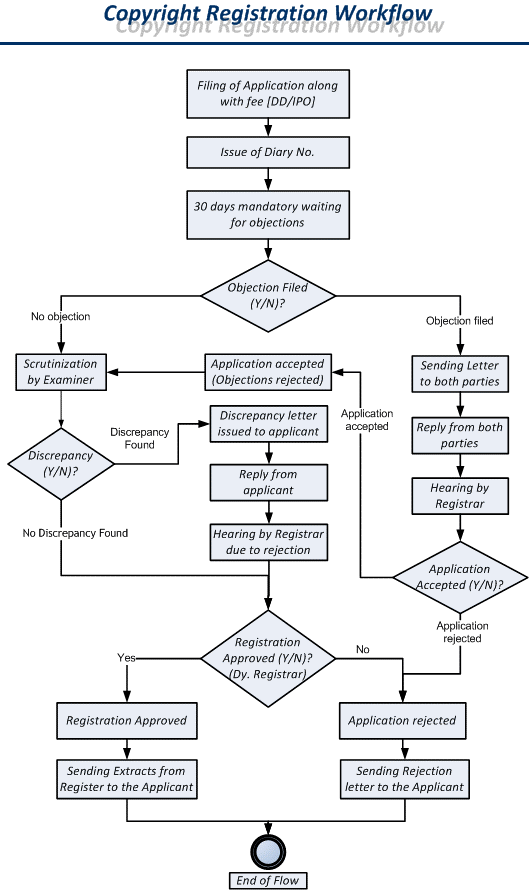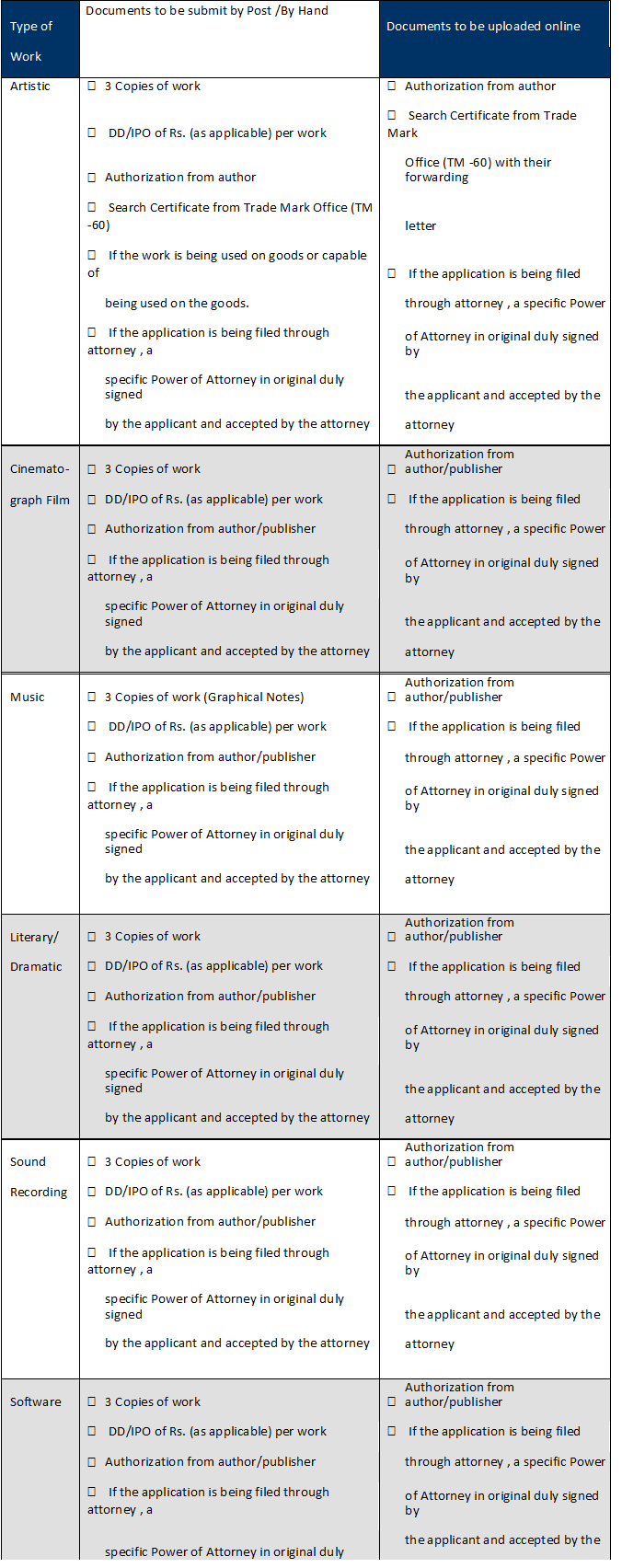About Copyright
Copyright is a legal right, existing in many countries, that grants the creator of an original work exclusive rights to determine whether, and under what conditions, this original work may be used by others]This is usually only for a limited time. Copyright is one of two types of intellectual property rights, the other is industrial property rights.The exclusive rights are not absolute but limited by limitations and exceptions to copyright law, including fair use. A major limitation on copyright on ideas is that copyright protects only the original expression of ideas, and not the underlying ideas themselves.
Copyright is applicable to certain forms of creative work. Some, but not all jurisdictions require "fixing" copyrighted works in a tangible form. It is often shared among multiple authors, each of whom holds a set of rights to use or license the work, and who are commonly referred to as rights holders.These rights frequently include reproduction, control over derivative works, distribution, public performance, and moral rights such as attribution.
Copyright is a legal right which has been provided to the developer and writer creators of literature, dramatics, musical and artistic work and films and sound recordings. Sometimes even businesses and startups get copyright registration related to instruction manuals, product literature and user guides. Usually, copyright is possessed by a creator of the work, but sometimes even the employer of its creator or the person who has authorised the work can own the copyright
Copyrights can be granted by public law and are in that case considered "territorial rights". This means that copyrights granted by the law of a certain state, do not extend beyond the territory of that specific jurisdiction. Copyrights of this type vary by country; many countries, and sometimes a large group of countries, have made agreements with other countries on procedures applicable when works "cross" national borders or national rights are inconsiste
Copyright registration in India is under Copyright Act, 1957. It is safety of work so that work done by the creator can not copy by anyone and to restore the same product in the public, the rights of reproduction, adaptation, and translation of the work.
Typically, the public law duration of a copyright expires 50 to 100 years after the creator dies, depending on the jurisdiction. Some countries require certain copyright formalities to establishing copyright, others recognize copyright in any completed work, without formal registration. Generally, copyright is enforced as a civil matter, though some jurisdictions do apply criminal sanctions.
Most jurisdictions recognize copyright limitations, allowing "fair" exceptions to the creator's exclusivity of copyright and giving users certain rights. The development of digital media and computer network technologies have prompted reinterpretation of these exceptions, introduced new difficulties in enforcing copyright, and inspired additional challenges to the philosophical basis of copyright law. Simultaneously, businesses with great economic dependence upon copyright, such as those in the music business, have advocated the extension and expansion of copyright and sought additional legal and technological enforcement.
Copyright licenses can also be granted by those deputized by the original claimant, and private companies may request this as a condition of doing business with them. Services of internet platform providers like YouTube, Facebook, GitHub, Hotmail, DropBox, Instagram, WhatsApp or Twitter only can be used when users grant the platform provider beforehand the right to co-use all uploaded content, including all material exchanged per email, chat or cloud-storage. These copyrights only apply for the firm that operates such a platform, no matter in what jurisdiction the platform-services are being offered. Private companies in general do not recognize exceptions or give users more rights than the right to use the platform according certain rules
Advantages of Copyright Registration
Right Production
Copyright Registration service as a prime face in the court of law owner of the work. The copyright option is provide the legal authorization of production of his work
Like trademarks, registration is not required to enjoy legal protection in a copyrightable work. A copyright is obtained automatically by the author as soon as some creative form of expression is fixed in a tangible medium. However, there are some significant benefits of registering your work with the India Copyright Office. These benefits include:
1. Public notice of your ownership. Your work will be published in the Copyright Office’s Catalog and will be searchable to the public. Anybody thinking of using this work will be able to search this Catalog and see that your work is protected. This gives constructive notice to the public that you own the work and helps defeat claims of “innocent infringement.”
2. Legal evidence of ownership. If somebody takes your work, registration will avoid a costly dispute over the actual ownership. Your copyright registration will provide proof of your ownership and relieve you of this legal burden.
3. Validity. Your registration will demonstrate the validity of your copyright if it is registered within five years of publication. This can prevent future challenges to your rights in the work.
4. Maximization of damages. Without a timely registration, a copyright holder is limited to actual damages in the case of infringement. These can be nominal and/or difficult to prove. With a registration, the copyright holder is entitled to statutory damages and attorneys’ fees. Rather than having to prove actual damages, a copyright holder with a timely registration may be eligible for statutory damages of up to 150,000 per infringement, plus attorneys’ fees. However, to claim these damages, the registration must be made within three months of the work’s publication or before the infringement occurs. Therefore, time is of the essence.
Required Details of Copyright
- 1. Name, address and nationality of the applicant
- 2. Name, address and nationality of the author of the work
- 3. Nature of applicant’s interest in the copyright i.e. OWNER / LICENSEE etc.
- 4. Title of the work
- 5. A declaration signed by the author (if different from the applicant)
- 6. Language of the work
- 7. Whether the work is published or unpublished
- 8. If the work is published, year and country of first publication and name, address and nationality of the publisher
- 9. Year and countries of subsequent publications, if any
- 10. Name, address and nationality of any other person authorized to assign or license the rights in the copyright
- 11. Power of attorney for the firm
- 12. Six hard copies of the work and three soft copies
- 13. (For computer programs – 3 copies of the program on CD ROMs.)
Protected work under a Copyright
Normely Protects the views and ideas example under the line
1 Sound Recording
2 Literary Works ,books .computer programing ,website etc
3 Musical
4 Dramatic Scripts for drama and film
5 Published works
6 Movies and drama film
7 Broadcasting
8 Artist like painting work
Process of Copyright

Our Package.
1 Complete Application Drafting
2 Complete Application Filing
3 Copyright Fees
4 Dairy Number
List of Documents required to be submitted by Hand/ By Post along with application form and to be uploaded online while filling the application form. Please refer to the document list based on Type of Work:



